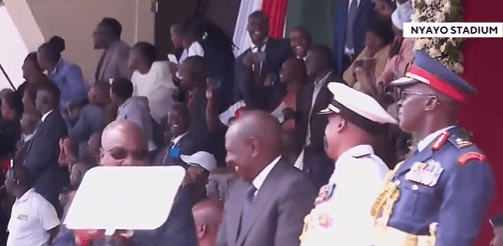The Covid-19 pandemic has seen companies realign their operations in order to ensure minimal disruption of activities while observing necessary preventive measures.
After suspending passenger services in compliance with government directives, Kenya Railways and Africa Star Railway Operation Company (Afristar), the operator of the Standard Gauge Railway (SGR) have come up with innovative ways to operate cargo while ensuring the safety and reliability of passenger coaches and freight wagons.
According to Lawrence Murithi, deputy superintendent, Rolling Stock Maintenance Workshop at Afristar, they have successfully made workplace adjustments to provide seamless railway services that meet the demand for cargo in Kenya and the region during the Covid-19 pandemic period.
Dubbed ‘’rolling stock maintenance workshop’’, the passenger coaches and freight wagons are inspected, repaired and maintained on regular basis; in a procedure known as preventative maintenance.
''We have continuously played our role of ensuring safety through regular maintenance and inspection on freight wagons,’’ Murithi, said.
According to him, the company made arrangements for the number of staff to proceed on paid leave and retained employees in core railway positions. As a result, the workload of the staff currently working has considerably increased.
As part of scheduled maintenance after every 300,000 kilometers or once a year, the team is currently working on single-vehicle brake system checks. This entails cleaning, performing tests, repair and replacements where necessary, for the freight wagons at the depot.
“We are also engaged in disassembly and assembly of essential parts of the bogie system, such as the longitudinal traction rod and the brake lever”, he said.
For starters, a bogie is a structure under railway vehicles to which wheels, axles and brake beams are attached. The team inspects, cleans and replaces bogie parts where necessary, besides performing lubrication.
Within the cabin area, the common maintenance activities include the replacement of worn-out stainless-steel water pipe fittings, repair of sanitary equipment, and repair of worn out, faulty or aging equipment such as the gas-water control panel.
According to Murithi, the barometric pressure gauges and vacuum gauges must operate within the normal operating range for optimal performance of breaks and washrooms.
These parts are fastened in their respective places if they are found loose. Those found faulty are promptly replaced.
He however indicates that maintaining SGR’s rolling stock comes with its own challenges, key among them being the increased workload for employees on duty, since some staff was sent on leave as part of the Covid-19 containment measures.
The work schedule can also be unpredictable, especially where there are changes in the train schedule.
As a further measure to protect the health of staff working during the pandemic, the company provided accommodation at work premises as well as quality meals.
In addition to ensuring zero infections, accommodation at work premises has resulted in uninterrupted 24-hour freight service despite the national curfew
Whereas the Covid-19 pandemic has negatively impacted on the general railway operations, it has also provided an opportunity to enhance the skills transfer programme.
For instance, Afristar has continuously provided technical skills transfer opportunities through daily training, practical operation training and flexible online training and examination.
“In the daily maintenance process, we are gaining professional knowledge and skills from our experienced Chinese teachers who performed the same jobs in China”, Murithi said.
Indeed, during the pandemic period, the rolling stock maintenance workshop has had tremendous achievements regarding the safety and training of the available staff.
“We have had no single accident or injury during the maintenance activities.
In terms of training, we have gained a lot from our Chinese teachers. We have been working closely with them”, Murithi said.

















